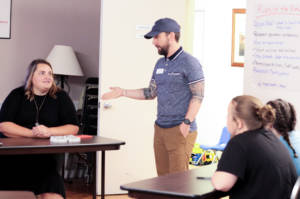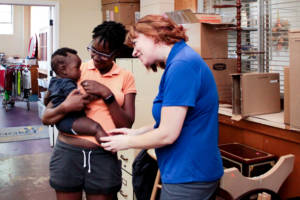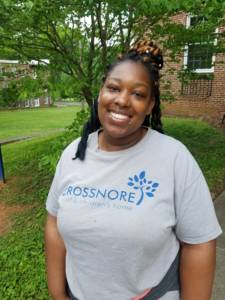One of the most frequently asked question we get is, “What happens to kids who age out of foster care?” We’ve all heard the stories about children who age out with nowhere to go and no one to help them.
Did you know that more than 23,000 children will age out of the U.S. foster care system every year? Twenty percent of those will become instantly homeless. Seven out of 10 girls will become pregnant by the age of 21. Only half of aging out youth will have obtained any kind of gainful employment by the time they reach 24. Fewer than 3% will ever receive a college degree. One out of every four, at least, will still suffer direct effects of PTSD.* And so on. The statistics are pretty bleak.
Changing the story.
 But at Crossnore, we will do whatever we can to help children who have experienced foster care write a different story for their lives. One way we do this is through our Youth in Transition program. Youth in Transition (YIT) helps facilitate a young person’s successful transition to adulthood by focusing on personal and professional growth in a variety of ways. Serving any child who has experienced foster care after the age of 14, YIT assists youth up to the age of 26.
But at Crossnore, we will do whatever we can to help children who have experienced foster care write a different story for their lives. One way we do this is through our Youth in Transition program. Youth in Transition (YIT) helps facilitate a young person’s successful transition to adulthood by focusing on personal and professional growth in a variety of ways. Serving any child who has experienced foster care after the age of 14, YIT assists youth up to the age of 26.
These are hard, transitional years for anyone – a critical time when all of us need help navigating the adult world and learning the ins and outs of education, employment, finances, housing, and more. Can you imagine having to do it on your own? Where you would be if you had been left on your own at the age of 18?
Standing in the gap.
Life would look very different for many of us without the support we had from our parents and families. Virginia Ford, YIT Coordinator on our Avery campus, knows that YIT makes a difference for these kids. “When they enter adulthood, we walk alongside them with support, encouragement, and guidance as they navigate the adult world.” Just like a parent would.
Karon McKinny, our Director of Youth in Transition, explained that YIT offers one on one support, as well as classes such as Financial Literacy and Adulting 101, a life skills training class. When a young person completes the Financial Literacy course, he or she is eligible to participate in our Matched Asset Program, where Crossnore will match their funds 1:1, up to $3,000, to help them do things such as purchase a reliable car or attain stable housing.
Persisting through challenges.
This program has lofty goals, yet there are many challenges that face our youth and our staff. Neil Barrett, YIT Coordinator on our Winston Salem campus, says that one of the biggest challenges is establishing trusting relationships with the teens. “Many of our youth have been part of the system for a long time, and they have been burned by it so many times. We have to work extremely hard to create meaningful relationships where they know they can trust us and that we want them to come to us with problems they are facing.”
Karon says that even communication can be hard. Once our children leave Crossnore or community foster care, they often lose their phones or their phones are turned off. With no number and no consistent address, it can be hard to even reach them, much less assist them. “The other major challenge,” she says, “is systemic. Our folks tend to be in multiple systems at the same time (social services, justice, education, housing, health). These systems are enormous and do not communicate with each other well. It is up to our young people to navigate them as best they can. They very often get lost in the shuffle.”
The look of success.
 So we do what we can to help. We keep calling and seeking out and loving our kids as they plow through these hard years and strive for independence. Success stories may not be glitz and glam. For many of our children, success is finding their own place, holding down a job, and paying their bills.
So we do what we can to help. We keep calling and seeking out and loving our kids as they plow through these hard years and strive for independence. Success stories may not be glitz and glam. For many of our children, success is finding their own place, holding down a job, and paying their bills.
“I think of one of our girls,” Karon says, “who, each semester, puts up with less than ideal part-time jobs so she can focus on her school work. She continues to receive (and text me!) high grades in her business classes as she gradually works toward her dream of opening a daycare. It is taking a long time. But she continues. That is what true success looks like.”
Life after foster care is hard. Virginia says that often youth make decisions or allow others to make decisions for them that lead to homelessness, unemployment, broken relationships, and burnt bridges. “The difference with Youth in Transition, though, is that when they are ready to make positive changes for themselves, there is someone standing there waiting to help them pick up the pieces and connect them to resources that support them in maintaining good choices.”
Hope for the future.
There is hope for children who age out of foster care, and we are proud to have a program that connects our children with that hope. Neil says, “We can provide them with the tools, skills, and support that will help them find stability, health, and hope in a situation where those things are extremely difficult to find.” Virginia adds, “Hope comes in the form of genuine, consistent caring and a community of positive and supportive people and agencies that will hold them accountable while still supporting them.”
 And when this hope comes to fruition, it’s a pretty exciting thing to be a part of. “I love seeing our folks move toward their dreams,” says Karon. “We get to celebrate their milestones: school graduations, engagements, children, new jobs. I get celebratory pictures and texts often. That’s my absolute favorite!”
And when this hope comes to fruition, it’s a pretty exciting thing to be a part of. “I love seeing our folks move toward their dreams,” says Karon. “We get to celebrate their milestones: school graduations, engagements, children, new jobs. I get celebratory pictures and texts often. That’s my absolute favorite!”
And so we carry on. One class at a time. One phone call at a time. One connection at a time. We love them, walk alongside them, encourage them, and let them know we’re here.
We get to see those light bulbs go off. We get to watch as they overcome frustration and overwhelming odds. We get to see them persist.
And because of our Youth in Transition program, we get to establish meaningful relationships and prod our amazing kids onto their dreams. And maybe we get a text once in a while, showing us a small piece of that dream achieved.
And dreams fulfilled make every single moment worth it.
To learn more about our Youth in Transition program, and what you can do to help, visit www.crossnore.org/youth-independent-living or email Virginia Ford at vford@crossnore.org.
Statistics for this post came from https://www.nfyi.org/51-useful-aging-out-of-foster-care-statistics-social-race-media/.



